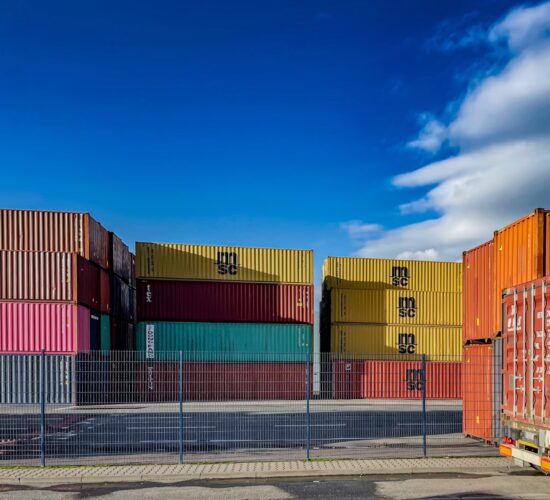Essential Tips for Secure Logistics Operations

Logistics is an essential function in the supply chain that involves the movement of goods from one point to another. In today’s fast-paced and globalized world, secure logistics operations are critical for ensuring goods’ safe and timely delivery. Security breaches in logistics can lead to significant financial losses, reputation damage, and even customer harm. Therefore, securing logistics operations is about safeguarding products and the entire business’s integrity. Here are some essential tips for ensuring the security of logistics operations.
Understanding the Importance of Logistics Security
Before diving into specific security measures, it’s essential to understand why securing logistics operations is crucial. The logistics industry handles vast amounts of valuable goods daily, including raw materials, finished products, and sensitive documents. A security breach can occur at various points in the logistics process, whether in transit, at a warehouse, or during storage. Cybersecurity threats, theft, and physical damage to goods are among the top concerns for logistics companies.
In addition, the logistics industry often deals with high-value shipments that criminals can target. The complexity of the global supply chain means that many businesses rely on a network of third-party providers for transportation, storage, and other services. This reliance creates potential vulnerabilities that must be addressed.
Conducting Risk Assessments
The first step in securing logistics operations is to conduct a thorough risk assessment. Identifying potential vulnerabilities and threats in your supply chain is the foundation of any security strategy. A risk assessment helps pinpoint areas of weakness, whether in the form of outdated equipment, inadequate security protocols, or third-party service providers that don’t meet security standards.
By evaluating risk across every aspect of the logistics operation, you can proactively mitigate potential threats. For instance, if the assessment reveals a high theft risk during transportation, you can invest in better vehicle security measures, such as GPS tracking and secure cargo containers.
Implementing Advanced Tracking and Monitoring Systems
Modern technology plays a crucial role in securing logistics operations. GPS tracking, RFID (Radio Frequency Identification), and IoT (Internet of Things) sensors provide real-time visibility of goods as they move through the supply chain. By integrating these systems, companies can monitor the status and location of shipments at any given moment. This provides greater control over logistics operations and acts as a deterrent to theft and fraud.
Advanced monitoring systems also help ensure the integrity of sensitive shipments. For instance, temperature-sensitive goods like pharmaceuticals require strict temperature control. By implementing IoT-based sensors, companies can monitor and adjust the temperature in real-time, ensuring products arrive correctly.
Enforcing Access Control Measures
A critical component of securing logistics operations is controlling who has access to sensitive areas and goods. Implementing strict access control measures at warehouses, transportation hubs, and loading docks can reduce the risk of theft and sabotage. This includes using biometric authentication systems, swipe cards, or even face recognition technologies to control entry to restricted areas.
Furthermore, access logs should be regularly reviewed to detect unauthorized access or suspicious activities. When it comes to logistics, it’s important to limit access only to authorized personnel and ensure they are well-trained in security procedures.
Partnering with Trusted Third-Party Providers
Given the complexity of logistics operations, businesses often rely on third-party providers for transportation, warehousing, and other services. However, it is essential to ensure that these partners adhere to the same security standards and protocols as your own company. Failing to vet third-party providers properly can expose your business to unnecessary risks.
When selecting third-party logistics (3PL) providers, they must consider their security track record, certifications, and compliance with relevant regulations. Ensure they are committed to safeguarding goods and have robust security measures. This might include everything from secure storage practices to vehicle security and employee background checks.
Training Employees on Security Protocols
Your employees are often the first line of defense in securing logistics operations. Therefore, proper training is essential. Staff should be familiar with security protocols and procedures for handling shipments, identifying potential security threats, and reporting suspicious activity.
Training programs should be established to keep employees up-to-date with the latest security technologies, procedures, and best practices. Security awareness training should cover many topics, including securing sensitive information, recognizing phishing attempts, and handling hazardous materials.
Regular Audits and Inspections
Regular audits and inspections are essential to maintaining a high level of security in logistics operations. Periodic audits of equipment, inventory, and security measures can help identify potential gaps in your system before they become major problems. Audits should be comprehensive and evaluate everything from warehouse security to transportation logistics and digital security protocols.
Conducting regular inspections ensures that all security systems are functioning correctly and helps identify areas for improvement. For example, a routine inspection may uncover a faulty GPS tracking system or a vulnerability in your cybersecurity defenses that could expose your operations to risks.
Building Strong Cybersecurity Defenses
In the digital age, cybersecurity is as critical as physical security in logistics operations. Cyberattacks targeting logistics companies can result in the theft of sensitive data, system outages, and financial losses. As logistics operations increasingly rely on digital technologies and cloud-based solutions, businesses must prioritize cybersecurity.
Implement strong firewalls, encryption protocols, and multi-factor authentication for all digital systems. Regularly update your software and systems to protect them from the latest threats. Training staff on cybersecurity best practices, such as identifying phishing emails and avoiding unsafe networks, is vital to protecting sensitive business data.
Ensuring secure logistics operations is not a one-time effort but a continuous process that requires vigilance, training, and investment in technology. Businesses can minimize security risks and safeguard their operations by conducting risk assessments, implementing advanced tracking systems, enforcing access controls, and partnering with trusted providers. In addition, regular audits, employee training, and strong cybersecurity defenses are essential components of a comprehensive logistics security strategy. By taking these steps, businesses can build a resilient logistics operation that protects their products and reputation.